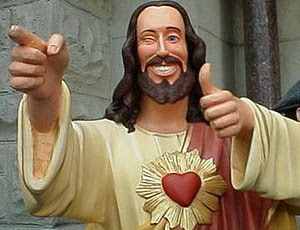Today I'd like to look at two articles that are mainly interesting in juxtaposition -- and a third that is as horrifying as it is enlightening.
The first is from Christianity Today and describes a one hundred million dollar ad campaign designed to bring the uncommitted, undecided, and "cultural Christians" -- what the people running the campaign call "the movable middle" -- back into the fold. The money is being spent for television and online advertisements, billboards, and YouTube videos, all designed to make Christianity look appealing to the dubious. The program is called "He Gets Us," and focuses on Jesus's warm, human side, his struggles against people who judged him, and his commitment to dedicate himself to God's will even so.
I'm perhaps to be forgiven for immediately thinking of the "Buddy Christ" campaign from the movie Dogma.
Haven, the group running the campaign, summed up the problem thusly: "How did the world’s greatest love story in Jesus become known as a hate group?"
The second article is a paper in the Journal of Secularism and Nonreligion, and attempted to quantify the degree of in-group favoritism and out-group dislike amongst various religions in the United States, agnostics, and atheists. Contrary to the common perception that "atheists hate the religious," the researchers found that the converse was closer to the mark:
Atheists are among the most disliked groups in America, which has been explained in a variety of ways, one of which is that atheists are hostile towards religion and that anti-atheist prejudice is therefore reactive. We tested this hypothesis by using the 2018 American General Social Survey by investigating attitudes towards atheists, Christians, Buddhists, Hindus, Jews, and Muslims. We initially used a general sample of Americans, but then identified and isolated individuals who were atheists, theists, nonreligious atheists, religious theists, and/or theistic Christians. Logically, if atheists were inordinately hostile towards religion, we would expect to see a greater degree of in-group favouritism in the atheist group and a greater degree of out-group dislike. Results indicated several notable findings: 1). Atheists were significantly more disliked than any other religious group. 2). Atheists rated Christians, Buddhists, Jews, and Hindus as favourably as they rated their own atheist in-group, but rated Muslims less positively (although this effect was small). 3). Christian theists showed pronounced in-group favouritism and a strong dislike towards atheists. No evidence could be found to support the contention that atheists are hostile towards religious groups in general, and towards Christians specifically.
The fact is, it's not the atheists who have a hate problem to address. I find Haven's disingenuous question about Christianity and hate groups wryly funny, especially since they have also run ad campaigns for Focus on the Family, one of the most virulently anti-LGBTQ+ groups in existence (they are on record as calling LGBTQ+ marriage and parenting equal rights as "a particularly evil lie of Satan").
Maybe the first thing to do before trying to market a kinder, gentler Jesus is for the Christians themselves, as a group, to confront the Religious Right's ongoing campaign of persecution against queer people. (And if you think I'm overstating the case by using the word "persecution," allow me to remind you that only six months ago, a pastor in Texas told a cheering congregation that anyone identifying as queer should be stood up against a wall and shot; only two months ago, a right wing nutjob went to a nightclub in Colorado Springs and did exactly as told; and shortly afterward, a different pastor told a different cheering congregation he was glad it had happened.)
And they wonder why people are looking at the church, shaking their heads, and walking away.
The last story I probably wouldn't have bothered commenting on if it hadn't been for the first two; in fact, when I first saw it, I thought it was a joke. It's about former United States Representative and current complete lunatic Michele Bachmann, who since her failed attempt at re-election has turned herself into a spokesperson for the evangelicals. She was on the Christian radio program Lions & Generals a couple of days ago, and proudly told the interviewer that she had spent Christmas day warning her grandchildren about the fires of hell.
No, I'm not making this up. Here's a direct quote:
I was with two of my grandchildren this weekend, a two-year-old and a six-year-old, and I was just compelled to talk to them about, when we die, it’s judgement," she said. "We talked about what heaven is, and we talked about what hell is. That hell is just as real as heaven. And in hell, there’s eternal fires and damnation and it’s a real place, we do not want to go there, that’s where the wicked will go. And then I explained how they don’t go — that they receive Christ and confess their sins … [Jesus] cleanses them and then because of his righteousness, they go to heaven... And so my little granddaughter immediately started saying, ‘I don’t want to go to hell, I want to go to heaven.’ I said, ‘Bella, can I pray with you? Let’s pray. Do you want to pray?’ … And I think, why miss an opportunity?


